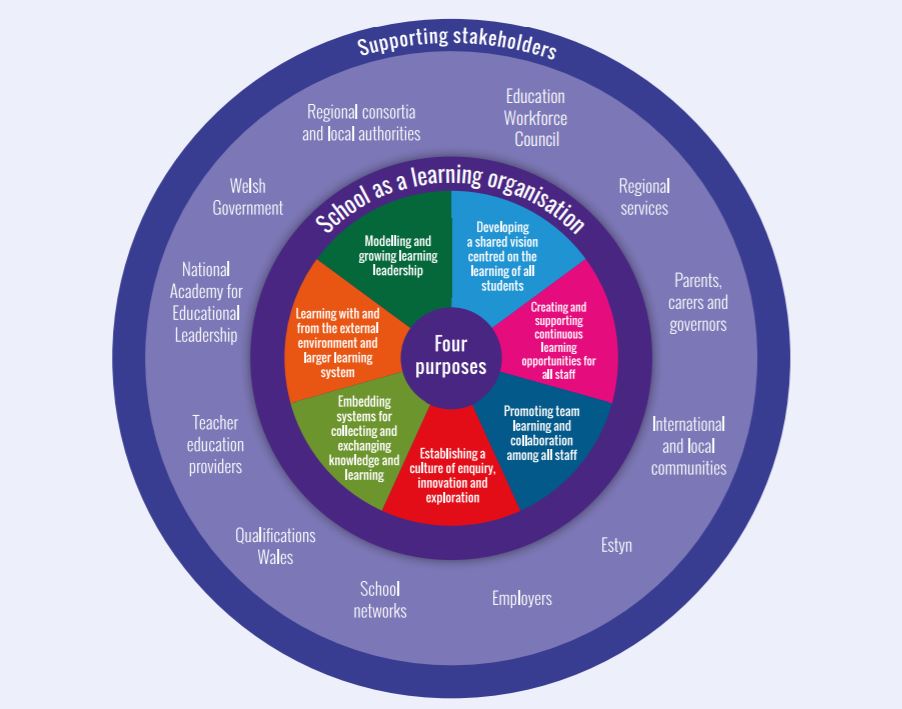‘Walking the walk’: Welsh Education Directorate becomes a ‘Learning Organisation’

For better or worse, the minutiae of government operations can easily fly under the radar of the average person.
Not so, in the domain of education.
The success or failure of an education system hits close to home, as most people have been through it. If they later come to care for learners who go to school, any faraway memories of textbooks and schoolyard games transmute into something more urgent. The school becomes a locus for deep concerns for their children’s well-being and their highest hopes for them to develop their potential to find a way in the world.
How education works, if it works, is not distant or abstract. It’s the reality faced daily at the school gate.
The enormity of responsibility and the importance of ‘getting education right’ is not lost on governments. Education remains an area on which governments spend a high proportion of their GDP and it is consistently an issue at the ballot box.
The scrutiny of this sector often leads to waves of successive reform.
Yet, evidence consistently shows that however well researched or targeted reforms are, efforts can fall short of expectation, without a governance structure that ensures apt policy development and its effective implementation.
The Welsh Government Education Directorate is well aware of this reality.
Since 2011, Wales has undertaken comprehensive, large-scale school improvement reform focused on raising standards, reducing the attainment gap, improving student support and the post-compulsory education system and the development and implementation of a new school curriculum.
Having decided on an arsenal of reform, Wales then turned attention to its capacity and capability to ensure effective national implementation.
Wales wanted to understand how its schools operate. It also wanted to dig deep into the barriers to effective implementation, especially in relation to the rollout of the new curriculum. It was also interested in how schools (and the consortia of regionally based school improvement services that work with them) respond to change and embrace innovation. These two tiers of the education system were first in focus, given their close proximity and high interaction with learners, whose learning outcomes and performance curriculum reform aimed to influence.

‘Learning Organisations’ in the education sector
A ‘Learning Organisation’ is one that is connected, collaborative and adaptable to change. Practices, culture, teamwork and individual behaviour all support this state.
In 2017, our colleagues at the OECD Implementing Education Policy team took this broad concept and worked directly with Wales to co-create something that specifically fit schools.
Enter: the ‘Schools as Learning Organisations’ (SLO) model.
The OECD collaboratively developed the SLO model with representatives of 24 Welsh Pioneer Schools, consortia, Estyn (the Inspectorate of Education and Training in Wales), the National Academy for Educational Leadership, and the Education Directorate of the Welsh Government. Together, they devised a model with seven dimensions:
- Developing and implementing a shared vision centred on the learning of all learners.
- Creating and supporting continuous learning opportunities for all staff.
- Promoting team learning and collaboration among all staff.
- Establishing a culture of enquiry, innovation and exploration.
- Embedding systems for collecting and exchanging knowledge for learning.
- Learning with and from the external environment and wider learning system.
- Modelling and growing learning leadership.
Strong capacity and capability across these dimensions would help schools to both learn from their environments in a routine way and apply their learning to new situations. In this way, they can stay abreast of change, adapting as they go.

Are schools in Wales Learning Organisations?
After developing the SLO model, the next natural step was to test it. Were schools in Wales already demonstrating some of the Learning Organisation dimensions? If this was true, what action were needed maintain momentum? If they were not, how far away are they from exemplifying each dimension? What should they do next to progress their journey?
These questions underpinned the OECD’s phased, mixed-method research design.
In the first phase, the OECD assessed schools to determine the extent to which characteristics particular to each dimension were present. This research consisted of a large number of interviews with school staff, policy makers and other stakeholders, desk research of documents and data, and a purposefully designed pilot ‘Schools as Learning Organisations’ survey. Staff from a random sample of 571 schools were asked to complete the online SLO survey. A total of 1,703 school staff (336 school leaders, 811 teachers and 382 learning support workers) from 178 different schools engaged with the pilot survey.
Ultimately, while some schools have a way to go, the majority are on a positive path to developing as learning organisations. Overall, schools in Wales are stronger on dimensions related to the promotion of team learning and collaboration, collecting, exchanging knowledge, and less so when it comes to developing a shared vision, establishing a culture of enquiry, innovation and exploration and learning from the external environment and larger system. The full report on this phase of the research is available here. A highlights report, summarising key findings is available here.
Having a SLO model that breaks down high-level concepts e.g. ‘learning’ into various dimensions is useful because, it can highlight strengths and areas for future development. This allows for a more nuanced understanding of what is happening within an organisation, so that it can ultimately tailor strategies to buttress or amplify activity, as needed.
Governments as Learning Organisations
So far, OECD research has focused on investigating the extent to which schools in Wales are developing as Learning Organisations.
But what about government?
Throughout this reform process, the gaze of the Welsh Government Education Directorate was focused outwards, on other parts of the education system and not itself. If the Directorate is going to be a staunch proponent of the SLO Model, it realised it had to ‘walk the walk’ and not just ‘talk the talk’.
Given our research specialisation in systems approaches to governance, our colleagues in the OECD Implementing Education Policy team collaborated with us to undertake the next phase of the project. This phase focuses on the system level policies related to ensuring that the SLO Model to take root across all tiers of the education system in Wales.
Staff from the Welsh Government Education Directorate took a learning organisations survey in May. A team from OECD then visited Wales in June to undertake qualitative interviews to validate survey results and explore wider challenges for the Directorates. In our talks with officials, we learnt about how they created and shared information collaborated and reacted to different types of feedback and gained an insight into the complex constellation of intra and inter-Directorate relationships.
Fostering adaptive innovation with the Learning Organisation model
The reform journey Wales is an excellent example of adaptive innovation and we are happy to be working with our colleagues so closely, as it unfolds.
Within the OPSI Innovation Facets model, the purpose of adaptive innovation is to develop new things or ways of working that allow an organisation to operate better in an evolving environment or to meet the changing expectations such a new environment might give rise to. Additionally, adaptive innovation can also be about exploration in and of itself, to see what new things or ways of working are even possible (even if they do not meet an immediately identifiable expectation or need).
While innovation portfolios should always be balanced, maintaining an adaptive innovation facet well is integral to governments’ and public organisations’ ongoing relevancy. It is this kind of innovation that keeps them sensitive and responsive to their operating environment, able to augment itself so it is always ‘fit-for-purpose’.
The Education System in Wales is actively looking to change what it does and how it does it. It is wise for Welsh Government to take stock via the LO assessment in order to best understand how investment in, and management of, adaptive innovation might help the sector achieve the aims of its comprehensive reform agenda.
Can the Learning Organisation model drive systems change?
Changing the historic dynamics of a complex system, especially one that directly involves children, emotions and public scrutiny, is not simple. It is difficult to broach a conversation about this level of change without raising some kind of ire, somewhere.
What we do know, however, that the age of incremental evolution and piecemeal policy approaches is ending. The rate of change in the world is exponential and what tomorrow looks like for today’s children eludes accurate prediction. This means that education systems need to have deep reflections on how they are adapting and frank conversations about why some of their reforms truly transform learning and lives…and others stumble out of the starting block.
As this research progresses, we will continue to share our own learning (that’s in the spirit of things, after all) reflecting on the potential usefulness of the learning organisations approach to realising educational reform and education systems change, to deliver the quality education learners deserve.
Stay tuned!











